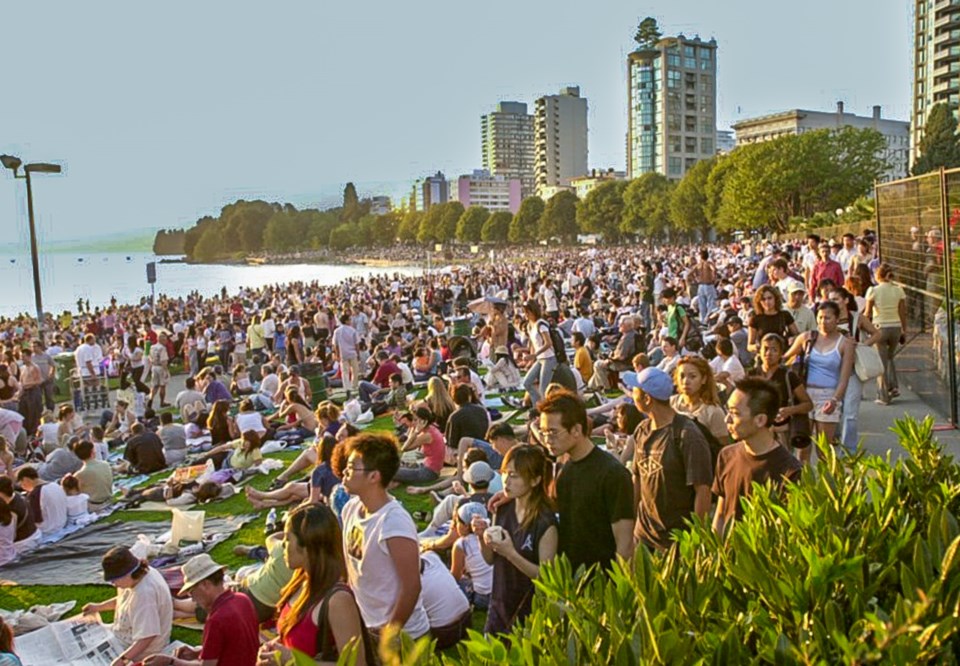For the second consecutive year, Vancouverâs English Bay beach is not being recommended to be among the beaches selected this summer to allow people to legally drink alcohol.
Thatâs because park board staffâs analysis of the seven beaches that participated in last summerâs trial â and other beaches not selected for the program â found English Bay continues to be a problem for authorities.
Violence and concerns about inebriated swimmers at English Bay and its neighbouring beaches were highlighted in that goes before city council May 7, which requests $930,300 to extend the trial this summer.
Though police calls decreased at English Bay and Third Beach over the past five years, the number of reported violent incidents increased from six in 2018 to 28 in 2023.
The report doesnât provide details of the incidents, when they happened or if any are connected to the well-attended fireworksâ nights at English Bay. Third Beach is located a short bicycle ride north of English Bay and popular for drum circles.
âWe cannot determine if alcohol consumption was the cause of this increase, or if it merely reflects the higher number of people visiting beaches through the pandemic,â the report said. âHowever, the jump in the number of violent incidents cannot be ignored at these two beaches.â
In addition, an analysis of complaints to the cityâs 311 phone service for English Bay and Third Beach over the past five years showed they quadrupled from 200 in 2018 to more than 820 in 2023.
The report didnât disclose the nature of complaints, but said cases that referenced people drinking were consistent across the majority of those years. A search of the 311 database using the word âdrinkingâ found complaints in August 2023 were up 50 per cent compared to the previous year.
âWith respect to disorderly and abusive behaviour, particularly at English Bay and Sunset beaches, the VPD had to get involved to settle behavioural and law-breaking issues,â the report said. âThere were concerns around glass bottles and containers posing a safety risk to the public.â
'Inebriated swimmers and parents'
For lifeguards, the report said increased alcohol consumption meant âthe necessity for increased vigilance on inebriated swimmers and parents, thereby increasing their workload and finding inadequate supervision on the beach.â
For park rangers, the main issues identified for patrolling the beaches included and excluded from last summerâs trial revolved around their inability to prevent unruly behaviour and to mandate valid identification from beach goers.
Last summer, the seven beaches that participated in the trial were Second Beach, Jericho Beach, Spanish Banks, New Brighton, Locarno Beach, John Hendry (Trout Lake) and Kitsilano Beach.
The same beaches are recommended to participate in the program this summer.
The trial ran between June 1 and Sept. 4 and operated in conjunction with the park boardâs program to allow public drinking in 48 park sites, including those adjacent to the seven beaches participating in the trial.
Those seven beaches were not without their problems, either, with the report saying there was âa significant increase in operational and enforcement issues and challenges for those beach pilot sites and into the downtown area.â
At Kitsilano Beach, for example, the number of violent incidents increased from four in 2018 to 12 in 2023. Kitsilano Beach also reported âexcessive litter conditionsâ all over the beach â three times more than any other beach.
'Public outrage or disrespect'
Approximately 60 park board staff across all departments were surveyed to understand how alcohol consumption on beaches affected their work.
Responses showed lifeguards and park rangers topped the list, while park operations staff, film and special events and the communications team also indicated their work had been impacted.
âThe main impacts to park board staff consisted of dealing with public outrage or disrespect, inadequate staffing/support on the beach and impacts to physical safety,â the report said.
Recommendations in the report call for more park rangers to create a presence on the beach and enforce bylaws. The VPD requires additional staff at the beaches, including English Bay and Sunset Beach, to âmaintain peace and safety, and manage incidents that involve dangerous or criminal behaviour,â the report said.
âThe addition of VPD and rangers will assist in reducing the responsibility of lifeguards and increasing vigilance so that their attention is not required elsewhere,â the report said.
âVPD has committed to recording more details with calls for service and violent offences, confirming the connection to alcohol consumption to support future data analysis and decisions.â
The cost breakdown to fund another summer trial would mean spending $450,000 on 12 officers deployed for eight-hour shifts between May and August. Another $480,300 would be spent on park board staff, including $154,700 for more rangers, $8,700 for lifeguards and more than $220,000 on communications, project management and planning.
Public opinion poll
Leger Consulting conducted a poll in the fall of 2023 regarding last summerâs trial and surveyed approximately 1,000 Vancouverites and another 1,000 who live in neighbouring cities.
Some of the findings:
⢠Of all respondents, 70 per cent believed alcohol should be allowed on most or all beaches. Nearly one quarter of respondents noted they consumed alcohol on beaches in 2023.
⢠When asked about the benefits of allowing alcohol at beaches, the top responses were âan affordable option to socialize, a nice setting to socialize and being treated like an adult.â
A quarter of respondents felt there were no benefits to allowing alcohol on beaches.
⢠When asked about the drawbacks to allowing alcohol on beaches, top responses included âattracting rowdy/loud/disruptive visitors, an increase in litter/waste on beaches underage drinking and concern for public safety.â
Despite not being included in the trial last year, English Bay was the most visited and popular beach by respondents (23 per cent), followed by Kitsilano Beach (15 per cent) and Spanish Banks (10 per cent).
Approximately 28 per cent said they rarely visit Vancouverâs beaches.



